




Ashford Port Health service, managed by Ashford Borough Council, is responsible for undertaking official border controls on a range of commodities, including high-risk food and feed, products of animal origin, and high-risk food and feed of non-animal origin.
The service operates at the Sevington Inland Border Facility (IBF), which is the busiest Border Control Post (BCP) in the country. Inland border facilities are UK government sites where customs and document checks can take place away from port locations. A Border Control Post (BCP) is a place where animals, plants, and their products coming into Britain from the EU and other third countries via seaports or airports are checked.
Agencies operating on the Sevington site include the Animal Plant and Health Agency who look after plants and seeds for planting and live animals. HMRC and Border Force run the customs site.
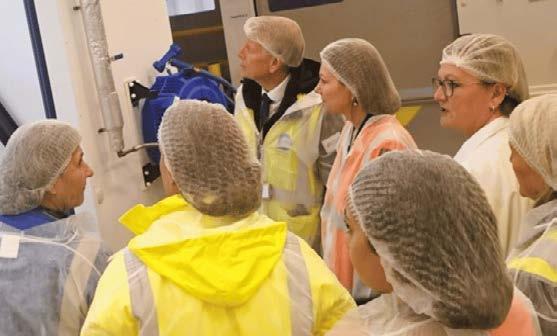

Welcome
• The Sevington BCP was developed to cover all sanitary and phytosanitary (SPS) goods, ensuring robust controls for products imported into Great Britain.
• The BCP operates 24 hours a day, making it unique among other BCP’s.
• The facility employs 158 local staff and is fully cost recoverable, not burdening local taxpayers.
• The BCP ensures biosecurity by stopping goods that pose a risk, such as those from regions with known issues to human health or animal health from disease or contamination.
• The service plays an active role in the Association of Port Health Authorities and collaborates with other local authorities and Border Force.
• Ashford Port Health’s role in helping enhance safety and security of the UK food chain.
• Ashford Borough Council has contributed to the local economy by employing local people and providing valuable training and skills.
• The council has trained around 20 Environmental Health Officers and is currently training another 20 with grant assistance from the Food Standards Agency.
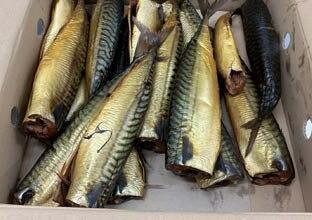
283518 – Country of origin –Lithuania – pre-notified as low risk composite products but within consignment chilled smoked headless mackerel (Scomber scombrus) was found.
Quantity = 2 boxes @ 10.80kg gross weight
Reason for rejection: chilled smoked headless Atlantic mackerel (Scomber scombrus) was misdeclared by agent as low risk. This type of product is classified under BTOM as Medium Risk as it is associated with histamine and must be imported with a corresponding model health certificate for the placing on the market of fishery products GBHC401 and a validated Catch Certificate from the competent authority of the country where the fishing vessel is registered.
Action: consignment was sent for destruction as Category 2 material.

225957 – Country of origin –Romania – chilled mixed meat products (pork, beef and sheep).
Quantity = 45 cartons @ 490.40kg gross weight
Reason for rejection: the chilled mixed meat products were produced from meat sourced in Germany (pork), Poland & Romania (beef) and Spain (sheep). The manufacturing plant is located in Romania in an affected African Swine Fever (ASF) area. Section AH/P301 of the health certificate presented with consignment has “drying” as treatment highlighted for the products. As manufacturing plant is within an ASF restrictred area, the minimum acceptable treatment required is “C” treatment.
Action: consignment was sent for destruction as Category 2 material after after Reg 20 TARP Notice expired while consignment was being detained at the BCP.
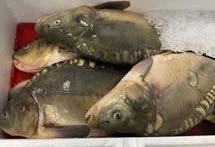
289640 – Country of origin –Poland – Frozen gutted royal carp and trout.
Quantity = 1,277 boxes @ 14,047.00kg gross weight
Reason for rejection: Visual examination revealed leakage from consignment and packages. When the trailer door was opened for inspection, there was a strong smell of putrefaction through microbial activity; some loose fish were on the floor of the trailer; some of the packages were damaged; the ice on top of the fish in the packages had melted and there was water log at the bottom of the boxes, fish was seating in the melt water; the fish were covered with slime.
Action: consignment was sent for destruction as Category 2 material.
The import checks are required to protect against food security and biosecurity risks from pests and diseases, to protect the economy, to protect the farming industry and to protect public health. Having robust food and feed controls in place also supports imports, exports, transits and future and existing trade deals by providing confidence to our trading partners.
On the 10 January 2025 Foot and Mouth import restrictions were put in place to protect UK biosecurity, following an outbreak in Germany. Ashford Port Health undertook import controls to safeguard UK imported food and feed and protect animal and public health. A previous Foot and Mouth outbreak in the UK in 2001 cost £8 billion pounds and so it is of vital importance that we deliver on our mission to safeguard UK imported food and feed and protect animal and public health.
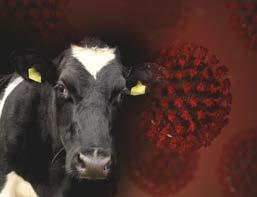
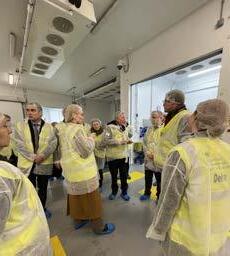
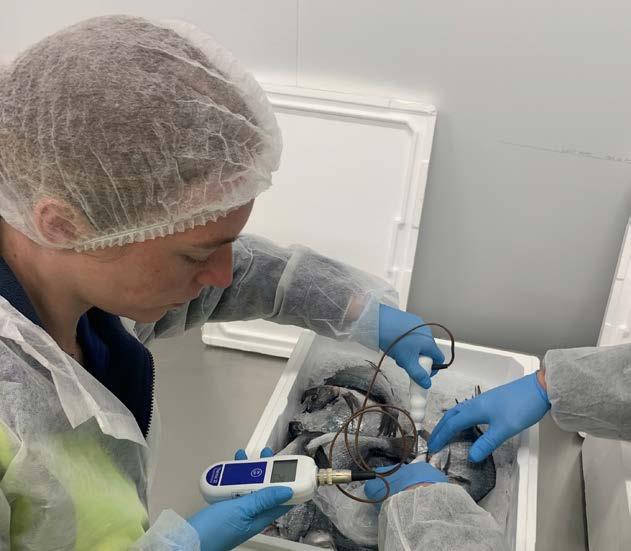
The British Ports Association are supportive of inland facilities preventing congestion at the ports further to introduction of checks on EU goods.
SPS goods are also controlled via customs controls and all vehicles must be sealed for security purposes so if they miss the facility, HMRC will be aware.
Overall, the IBF site will play an important role in providing skills and work for people within the Kent Coastal Marmot Area.
The team has trained around 20 Environmental Health Officers helping deal with a national shortage of such professionals.
“May I just take this time to say sorry for being a pain in the proverbial backside this year, it’s been a tough year that’s for sure, but without yourselves I wouldn’t be sat here now - so a big thank you for all your help this year.”
The BCP is the place where legally imported goods are imported to the country.
Local Authorities are not responsible for smuggled goods or personal imports as that is a role undertaken by Border Force.
We are part of the Association of Port Health Authorities and recently hosted a training day for Port Health officials from around the UK.
Ashford Porth Heath is leading on a project to develop an AI aided system to help speed up clearance at the border.
“We had a meeting with a number of our high-volume hauliers concerning our future plans for invoice arrangements and which PHAs did they feel had the billing sorted out as a procedure. Your team was identified as “getting it right” in the trade’s eyes.”
Figs from Turkey – testing for Aflatoxin B1
There were 7 pallets in total of dried figs which originated from Turkey which is listed in Annex II of Assimilated Regulation 2019/1793. Article 11 of that Regulation requires an official certification to be provided for this product from the country. No such documents were provided. This consignment was sampled and was held pending analytical results for aflatoxins.
The sample was unsatisfactory as two of the laboratory samples contained levels of aflatoxin B1 and total aflatoxin which exceeded their respective maximum permitted levels.

Sharon joined Ashford Port Health on 26 June 2022 as a technical assistant. She was sponsored and supported by the team at Ashford to undertake the Higher Certificate in Food Control. Sharon graduated from Birmingham in July 2023. She carried on with her studies and managed to pass the CIEH professional competency portfolio and interview and so has just qualified as a Port Health Officer on the 26 June 2024.
Sharon always seems to be in the right place at the right time and her sense of smell will remain legendry here at Ashford.
Sharon happened to be passing the swim lanes on site at Sevington Inland Border Facility (IBF), where she caught a whiff of putrid fish in the air and noted that there was effluent on the tarmac. Sharon quickly made contact with the Site Operator and tracked down the offending vehicles.
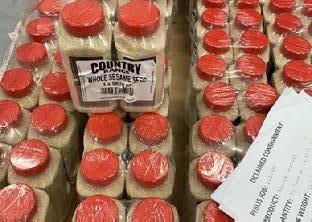
Sesame Seeds from India – testing for pesticides
Sesame seeds 70 boxes from India, attached lab report was incomplete. Detained pending sampling results for pesticide residues. Results failed and the product was destroyed. Annex II 2019/1793
Pistachio Nuts from Turkey – testing for Aflatoxin B1
Total weight 5232kg 480 boxes
UNSATISFACTORY - Contamination
Under Commission Regulation (EC) No 1881/2006, implemented by The Contaminants in Food (England) Regulations 2013, the sample is permitted to contain a maximum of 8µg/kg (micrograms per kilogram) of aflatoxin B1 and a maximum of 10 µg/kg of total aflatoxin. The sample results exceeded the permitted levels and was therefore unsatisfactory, the product was destroyed.
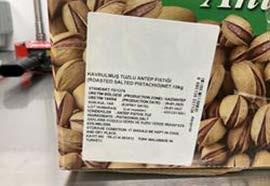

She requested that they be brought round to the Border Control Post (BCP) for further investigation.
The vehicles were brought round to the BCP where foul fish smelling water was found to be to leaking from the back of the vehicles and gushing out of one.
On questioning, the drivers became very defensive and refused to give print outs from the data loggers as to show the temperature records. One of the drivers quickly drove off attempting to leave the site, which was refused, and they were successfully returned to the BCP area of the IBF.
Once the leaking fish water subsided from the trailers, the vehicles were docked into the Porth Health inspection bays. On inspection, the lorry that was found to be gushing fish smelling water, the refrigeration did not appear to be switched on, the vehicle had no seal, broken boxes with dirty handprints and marks which also contained no ice.
Consequently, the fish was in a degraded and unacceptable state. This later a Trade in Animals and Related Products (TARP) regulation 20 notice being served.
Port health has since continued local surveillance on this company by calling in vehicles for inspection.
We have also been liaising with border force, providing intelligence due to the suspicion of people smuggling.
So well done to Sharon for her great sense of smell and for jumping into action brilliant work.